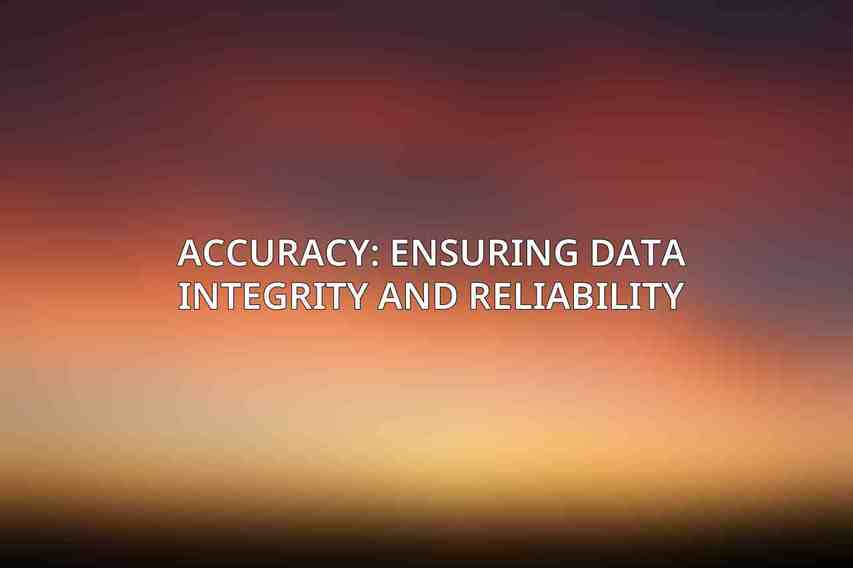Effective reporting plays a vital role in transforming raw data into actionable insights. businesses rely on analytics reports to make informed decisions, track performance, and drive growth. To ensure that analytics reports are impactful and insightful, it is essential to adhere to five key principles that encompass clarity, relevance, accuracy, timeliness, and visual appeal.
Clarity: Crafting Understandable and Accessible Reports
Clarity is paramount. reports should be crafted in a way that is easily understandable and accessible to the intended audience. establishing a clear objective is the first step in creating a meaningful report. by defining the purpose and audience of the report, analysts can tailor the content to meet specific needs. Using Concise Language is crucial to avoid overwhelming readers with technical terms and jargon. Organizing information with Structured Comprehension in mind, such as using logical sequences and headings, enhances readability. Moreover, providing Definitions and Context for key terms and concepts helps ensure that all stakeholders are on the same page.
Relevance: Aligning Reports with Business Objectives
Reports in analytics must align closely with business objectives to provide maximum value. Gathering Insights for Decision-Making involves focusing on metrics that directly impact key performance indicators (KPIs). It is crucial to Align with Stakeholder Needs by tailoring reports to cater to specific audiences and their interests. Including Contextual Information such as background details and market trends provides a comprehensive view. Moreover, Highlighting Actionable Takeaways helps stakeholders identify key insights and recommendations for improvement.
Accuracy: Ensuring Data Integrity and Reliability

The cornerstone of effective analytics reporting lies in data accuracy and integrity. To ensure this, it is imperative to Validate Data Sources diligently to guarantee their reliability. Cross-Checking Findings across various sources helps in minimizing errors and discrepancies. Implementing Quality Control mechanisms enables the detection and correction of data anomalies. Additionally, it is essential to Clearly Indicate Data Limitations by acknowledging any constraints in data availability or quality.
Timeliness: Providing Up-to-Date and Relevant Information

Timely reporting is critical. setting reporting cadences at optimal frequencies ensures that stakeholders receive information promptly. leveraging automation tools streamlines report generation processes, saving time and resources. Implementing Real-Time Monitoring allows for the timely tracking of key metrics and alerts for immediate insights. It is crucial to Adjust Cadences as Needed to align with evolving business requirements.
Visual Appeal: Enhancing Comprehension and Engagement
Visual elements are key in enhancing the overall appeal and comprehension of analytics reports. Using Visualizations Effectively, such as charts, graphs, and tables, helps present data in a visually engaging manner. Choosing Appropriate Visual Formats that align with the data type and audience aids in effective communication. Ensuring Accessibility for all users, regardless of abilities, is essential in inclusive reporting. By Maintaining Consistent Design through templates and style guides, report readability and professionalism are enhanced.
adhering to these five key principles – clarity, relevance, accuracy, timeliness, and visual appeal – is instrumental in creating effective analytics reports that drive business success. By following these guidelines, organizations can leverage data insights to make informed decisions, foster growth, and stay ahead in a competitive world.
Frequently Asked Questions
What is effective reporting in analytics?
Effective reporting in analytics involves presenting data and insights in a way that is clear, concise, and actionable for decision-makers.
Why is effective reporting important in analytics?
Effective reporting is important in analytics as it helps organizations understand performance, track progress towards goals, and make informed decisions based on data-driven insights.
What are the key principles of effective reporting in analytics?
The key principles of effective reporting in analytics include focusing on relevant metrics, using visualizations to tell a story, ensuring data accuracy and reliability, providing context to the data, and customizing reports based on the audience’s needs.
How can I improve my reporting skills in analytics?
You can improve your reporting skills in analytics by practicing data visualization techniques, staying updated on reporting best practices, seeking feedback from peers, and continuously refining your reporting process. Explore further with Real-World Successes: Reporting Best Practices Case Studies
What are the common pitfalls to avoid in analytics reporting?
Common pitfalls to avoid in analytics reporting include relying on vanity metrics, neglecting the storytelling aspect of reporting, overwhelming the audience with excessive data, failing to verify data accuracy, and not customizing reports for different stakeholders. Dive deeper into How to Write an Engaging Data Report: A Step-by-Step Guide

